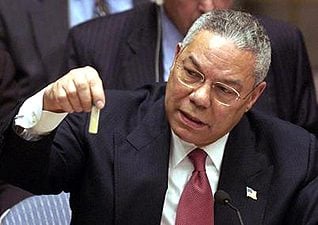
The 2003 war against the regime of Saddam Hussein will always be remembered for the absence of one of the main reasons to start it: the hidden weapons of mass destruction (WMD). Nevertheless, the programs for chemical and biological weapons run by the Iraqis before the UN inspectors entered the country after Desert Storm, in the summer of 1991, were diverse and vast. Iraq was called a theme park for WMD scientists for a reason.
After the massive chemical attacks in World War I and Japan’s biological campaigns in World War II, chemical an biological weapons were widely considered as useless in military tactics. Iraq, however, thought otherwise after it was confronted by tactical setbacks during the war with Iran in the 1980s. The Iraqi industries started to produce teargas, blister agents such as mustard gas, and several types of nerve gas. Technicians succeeded in putting these toxic substances in aerial bombs, artillery grenades, missile warheads and spraying tanks for combat-aircraft. Artillery bombardments with gas-filled grenades were used dozens of times against the numerically superior but lightly armed Iranian forces, especially on the southern front, when a breakthrough loomed.
Iraq had signed but not ratified the Biological Weapons Convention, and had not signed the Chemical Weapons Convention. Although highly controversial, international protest against the attacks was limited. Iran also produced toxic gasses. However, the Iraqi attacks with nerve gas on the Kurdish town of Halabja in 1988 that left 10,000 civilians dead or wounded, caused an international uproar.
UNSCOM
When UNSCOM inspectors entered the country they started to dismantle and destroy equipment, infrastructure and precursor chemicals that made up the vast chemical weapons program about which the Iraqi authorities had provided many details. But with the mopping up arose questions concerning other hidden programs. It appeared that the Iraqi regime had sacrificed the chemical weapons program to divert attention away from its crown jewels: biological weapons and VX, a nerve agent even more toxic than the tabun and sarin that had been declared – and destroyed.
Interviews with Iraqi scientists, pre-war orders of specialized equipment and materiel, missing documents, and an apparent Iraqi deception program, all pointed in the direction of a larger-scale program than officially admitted. After a lot of pressure – and detective work by UNSCOM and western intelligence services – Iraq reluctantly admitted that more research had been done on anthrax, botulinium-toxin, camelpox and other biological weaponry. At the same time the government denied having developed the grenades, bombs and missiles that could transport and spread the substances over the targets.
UNSCOM questions and allegations regarding the missing pieces were met with denial. Iraq’s position became untenable when general Hussein Kamel al-Majid, a relative and son-in-law of Saddam Hussein and as head of military industries responsible for all weapons research, defected to Jordan. Immediately after his flight the Iraqi government produced a stash of documents stored at one of al-Madjid’s chicken farms. This confirmed what al-Majid had been telling Western intelligence agents shortly after his arrival in Jordan: Iraq had weaponized biological weapons and produced aerial bombs and missile warheads. These were said to have been destroyed. The Iraqi government also admitted to having produced more VX gas than previously declared to UNSCOM.
Whether Iraq still possessed the capability or had the intention to produce weapons of mass destruction when the 2003 attack on Iraq started, will always remain a topic of discussion. Many questions on missing equipment and dubious archiving remain unanswered. What is sure is that no WMD were found.

